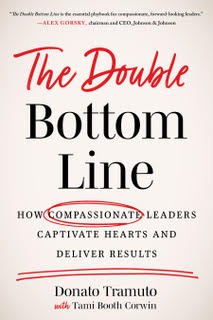“Putting people first and delivering results are not two separate goals,” according to the book, The Double Bottom Line. “Rather, a strong focus on people drives strong results, creating the double bottom line,” adds author Donato Tramuto (with Tami Booth Corwin).
Tramuto's findings are based on decades of experience, numerous studies, original qualitative research of 1,500 participants, and in-depth interviews with nearly 40 successful leaders who practice compassionate leadership.
“Research reveals that most leaders have an innate desire to be compassionate, but many don’t know how to put it into practice,” adds Tramuto.
The Double Bottom Line defines compassionate leadership as:
Listening to others’ challenges, needs, or problems, having empathy for them and then actually doing something about it.
Additionally, where empathy is the ability to think about and feel for another person’s problems, suffering, or experience. And, where compassion, on the other hand, usually starts with or coexists with empathy, but it adds the desire and action to relieve that person’s suffering, help them overcome a challenge, or otherwise better their situation.
- Tramuto says that compassionate leadership is driven by a desire and a commitment to better your people, your customers, your stakeholders, and your community. It’s about understanding what touches the hearts of others in order to bring out the best in them and allow them to feel connected to their work and see it as a part of something bigger than themselves.
However, “practicing compassionate leadership effectively does not mean ignoring or setting aside the tough issues,” explains Tramuto. “It doesn’t mean that you let people off the hook if they need constructive feedback. It doesn’t mean that people who don’t perform or who do something to damage your culture, or your company shouldn’t be held accountable.”
“Now more than ever, leaders need to upgrade skills, such as communication, transparency, adaptability, and understanding and support of employee’s needs,” shares Tramuto. “I challenge leaders to see compassion in a different light, as a strength, a critical skill, and as an imperative.”
In the book, Tramuto explains how leaders can be strong, firm, and tough while sticking to their values and principles. It makes the case that compassion is power.
Finally, one of my favorite takeaways from the book is where Tramuto explains how great leaders are great listeners, and where he clarifies the differences between hearing, listening and understanding:
- Hearing is the simple perceiving of sound. It doesn’t’ take any action on the part of the person hearing. It is passive.
- Listening involves action. Listening is hearing something with thoughtful attention. A good listener is involved in conversation with committed participation. It involves a conversation.
- Understanding requires thoughtful attention with some empathy and inquiry added. To understand, you must ask relevant questions and build as complete and accurate a picture as possible through reconfirmation of information shared. It is active and interactive.
Thank you to the book’s publisher for sending me an advance copy of the book.

Comments
Post a Comment